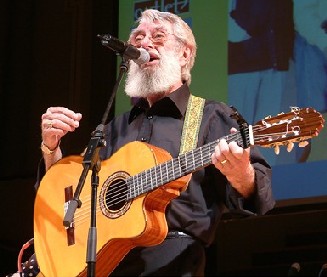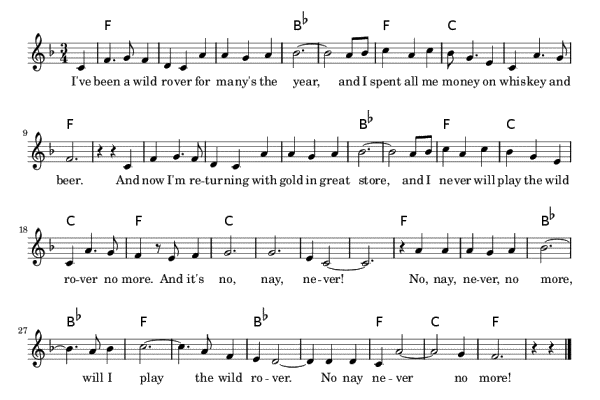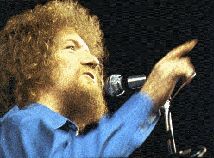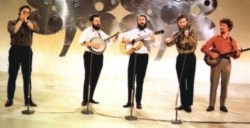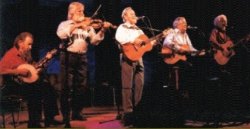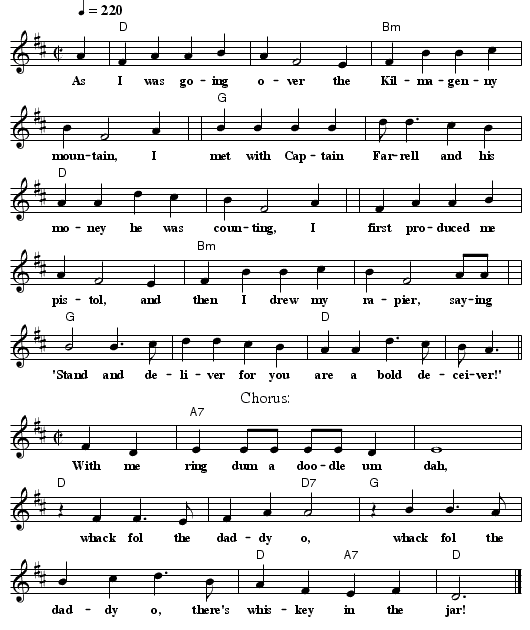Christmas 2012 and the Dubliners made their final appearance in their native town. After 50 years as a ballad
group and with none of the original members remaining it was time to put the instruments back in their cases and
take a well earned rest. Have you ever wondered, of all their ballads, which one song gave the Dubliners their start?
The Wild Rover
THE WILD ROVER
I've been a wild rover for many's the year
I've spent all me money on whiskey and beer
But now I'm returning with gold in great store
And I never will play the wild rover no more
And it's no, nay, never
No, nay, never, no more
Will I play the wild rover
No never no more
I went in to an alehouse I used to frequent
And I told the landlady me money was spent
I asked her for credit, she answered me "nay
Such a customer as you I can have any day"
I took up from my pocket ten souvereigns bright
And the landlady's eyes opened wide with delight
She says "I have whiskeys and wines of the best
And the words that you told me were only in jest"
I'll go home to my parents, confess what I've done
and I'll ask them to pardon their prodigal son
And when they've caressed me as oft times before
I never will play the wild rover no more
 Listen to The Wild Rover from:
Mick West, Maeve Mackinnon
Listen to The Wild Rover from:
Mick West, Maeve Mackinnon
 Watch The Wild Rover from:
The Dubliners (2012)
Ronnie Drew, Luke Kelly
Watch The Wild Rover from:
The Dubliners (2012)
Ronnie Drew, Luke Kelly
[Roud 1173; G/D 7:1480; AFS 99; Ballad Index MA069; Bodleian Roud 1173; Wiltshire 1019; trad.]
A.L. Lloyd sang The Wild Rover in 1958 on the Wattle LP
Across the Western Plains.
He commented in the album's sleeve notes:
In the nineteenth century, this popular street ballad was issued over and
over again on broadsheets by Catnach, Such, Bebbington and other stall-ballad
printers. An older song,
The Green Bed,
describing the adventures of a sailor in an uncharitable boarding house,
seems to be the parent of Wild Rover.
It appears to have survived better in Australia than in the country of its
origin. As late as the early thirties it was quite common along the Bogan and
Lachlan Rivers, and presumably elsewhere. I heard two or three tunes for it,
but this version learned in the Condobolin district in 1929, from a South
Australian named E. Barratt, is the best I know. I never heard in the
bush the tune used by Burl Ives but that's not to say it wasn't sung.
Other versions are to be found in
Ashton's Modern Street Ballads,
Creighton's Songs and Ballads from Nova Scotia,
Paterson's
Old Bush Songs,
likewise in Old Bush Songs
ed. Stewart and Keesing.
David Lumsden sang The Wild Rover
in 1963 on his, Brian Mooney and Martyn Wyndham-Read's Australian album
Moreton Bay.
And Martyn Wyndham-Read or Phyl Vinnicombe sang The Wild Rover
in 1967 on their and Peter Dickie's Australian album
Bullockies, Bushwackers and Booze.
Concerning “survived better in Australia”—of course
just a few years
later in 1964 the Dubliners had a huge hit with The Wild Rover.
They learned it from Peggy Seeger and Ewan MacColl's Seeger's 1960 book
The Singing Island,
who themselves collected it at the end
of the 1950s from Sam Larner. His version was published in 1961 on his
Folkways album
Now Is the Time for Fishing.
Cyril Tawney sang The Wild Rover
in 1962 on his HMV EP
Baby Lie Easy: Songs from the West Country.
All tracks of this EP were included in 2007 on his anthology
The Song Goes On.
Peter Kennedy commented in the original album's sleeve notes:
Learned contagiously from a National Serviceman of Irish extraction on board
a floating electrical school in Plymouth harbour. He sang it “in a
beautiful piping Irish tenor voice” at one of the Naval singing parties
held in the Cornish side of the water in one of those old wooden hulks that lie
there for the purpose. We hope no interfering official has taken them away,
otherwise we never, no never, can go there any more.
Louis Killen heard a version of Wild Rover on BBC radio in the
1940s, remembered it later, and added it to his repertoire, padded out with
Sam Larner's words. He sang it in a midnight concert in May 1963
in London. This concert was published on the Decca LP
Hootenanny in London.
Nearly ten years later he sang in with the Clancy Brothers in a live
recording from the Bushnell Auditorium in Hartford, Connecticut on their LP
Live on St. Patrick's Day.
Sandy Denny recorded The Wild Rover on November 7, 1966
for the BBC broadcast “The Johnny Silvo Folk Four”. I don't know
of any official publication or bootleg of this recording.
And Wild Rover No More is the title track on Jimmy McBeath's 1967
Topic album
Wild Rover No More.
Peter Hall noted:
A song known in England as
The Green Bed
and common in North-east
Scotland under the title Johnny and the Landlady, is thought to be
the original of this piece. Dean Christie found the older song in Banffshire
more than a century ago and printed it as The Brisk Young Sailor.
The Wild Rover owes its popularity to its wide circulation as a
broadside during the 19th Century. Musically, the Aberdeenshire
versions show most similarity to those from East Anglia leading one to suspect
that the song may have been carried by sea up the East coast.
The Halliard (with Nic Jones) sang The Wild Rover
in 1967 on their album
It's the Irish in Me.
Robin and Barry Dransfield sang The Wild Rover
in 1971 on their Trailer album
Lord of All I Behold.
Jim and Sylvia Barnes sang Wild Roving No More
in 1979 with their group
Kentigern
and in 1985 with their trio
Scotch Measure;
both eponymous albums were released on the Topic label.
Brian Peters and Gordon Tyrrall sang The Wild Rover
in 2000 on their duo CD
The Moving Moon.
They noted:
The Wild Rover had a vigorous life as an English country song
before becoming the tub-thumping anthem of Irish singing groups in the 1960s.
We base our rather more reflective version on a set collected in Hampshire in
the 1900s.
 Brian Peters also sang it on his 2015 CD
Squeezebox, Voicebox.
This video shows Brian Peters at the National Folk Festival, Canberra, 2016.
Brian Peters also sang it on his 2015 CD
Squeezebox, Voicebox.
This video shows Brian Peters at the National Folk Festival, Canberra, 2016.
Bob Davenport sang The Wild Rover
in 2004 on his Topic CD
The Common Stone.
Jim Causley sang Wild Rover
in 2007 on his WildGoose CD
Lost Love Found.
He commented in his sleeve notes:
This more reflective, melancholic version of the somewhat tired old rover
was collected from a sailor in Plymouth by the late, great Cyril Tawney. I do
love finding interesting versions of songs that have a groan-factor when you so
much as mention their names, if only to remind folks that the reason they've
been done-to-death is simply because they're fantastic songs.
Andy Turner learned The Wild Rover
from the singing of Sam Larner and sang it
as the June 5, 2012 entry of his project
A Folk Song a Week.
© mainlynorfolk.info/lloyd/songs/thewildrover.html
Whiskey in the Jar
WHISKEY IN THE JAR
As I was going over far fam'd Kerry Mountains
I met with Captain Farrell and his money he was countin'
I first produced my pistol, and I then produced my rapier
Sayin': "Stand and deliver for you are my bold deceiver"
Musha ring dum a doo dum a da
Whack fol de daddy Oh
Whack fol de daddy Oh
There's whiskey in the jar
I counted out his money and it made a pretty penny
I put it in my pocket, and I took it home to Jenny
She sighed and she swore that she never would deceive me
But the devil takes the women for they never can be easy
I went into my chamber all for to take a slumber
I dreamt of gold and jewels and for sure it was no wonder
But Jenny drew my charges and she filled them up with water
Then sent for Captain Farrell to be ready for the slaughter
'Twas early in the morning just before I rose to travel
Up comes a band of fottmen and liekwise Captain Farrell
I first produced my pistol for she stole away my rapier
But I couldn't shoot the water, so a prisoner I was taken
If anyone can aid me 'tis my brother in the army
If I can fidn his station in Cork or in Killarney
And if he'll go with me we'll go roving in Kilkenny
And I'm sure he'll treat me better than my darling sporting Jenny
 Listen to Whiskey in the Jar from:
Brian Roebuck, ThingumaJig
Listen to Whiskey in the Jar from:
Brian Roebuck, ThingumaJig
 Watch Whiskey in the Jar from:
The Dubliners (2012)
Seán Cannon, Luke Kelly
Watch Whiskey in the Jar from:
The Dubliners (2012)
Seán Cannon, Luke Kelly
"Whiskey in the Jar" is an Irish traditional song set in the southern mountains of Ireland, often with specific mention of counties Cork and Kerry. The song, about a rapparee (highwayman) who is betrayed by his wife or lover, is one of the most widely performed traditional Irish songs and has been recorded by numerous artists since the 1950s.
The song first gained wide exposure when the Irish folk band The Dubliners performed it internationally as a signature song, and recorded it on three albums in the 1960s. In the U.S., the song was popularized by The Highwaymen, who recorded it on their 1962 album Encore. The Irish rock band Thin Lizzy hit the Irish and British pop charts with the song in 1973. In 1990, The Dubliners re-recorded the song with The Pogues with a faster rocky version charting at No.4 in Ireland and No.63 in the UK. The American metal band Metallica in 1998 played a version very similar to that of Thin Lizzy's, though with a heavier sound, winning a Grammy for the song in 2000 for Best Hard Rock Performance. In 2019, Canadian singer-songwriter Bryan Adams performed a cover of the song on his album Shine A Light.
Story
"Whiskey in the Jar" is the tale of a highwayman or footpad who, after robbing a military or government official, is betrayed by a woman; whether she is his wife or sweetheart is not made clear. Various versions of the song take place in Kerry, Kilmoganny, Cork, Sligo Town, and other locales throughout Ireland. It is also sometimes placed in the American South, in various places among the Ozarks or Appalachians, possibly due to Irish settlement in these places. Names in the song change, and the official can be a Captain or a Colonel, called Farrell or Pepper among other names. The protagonist's wife or lover is sometimes called Molly, Jenny, Emzy, or Ginny among various other names. The details of the betrayal are also different, being either betraying him to the person he robbed and replacing his ammunition with sand or water, or not, resulting in his killing the person.
History
The song's exact origins are unknown. A number of its lines and the general plot resemble those of a contemporary broadside ballad "Patrick Fleming" (also called "Patrick Flemmen he was a Valiant Soldier") about Irish highwayman Patrick Fleming, who was executed in 1650.
In the book The Folk Songs of North America, folk music historian Alan Lomax suggests that the song originated in the 17th century, and (based on plot similarities) that John Gay's 1728 The Beggar's Opera was inspired by Gay hearing an Irish ballad-monger singing "Whiskey in the Jar". In regard to the history of the song, Lomax states, "The folk of seventeenth century Britain liked and admired their local highwaymen; and in Ireland (or Scotland) where the gentlemen of the roads robbed English landlords, they were regarded as national patriots. Such feelings inspired this rollicking ballad."
At some point, the song came to the United States and was a favourite in Colonial America because of its irreverent attitude toward British officials. The American versions are sometimes set in America and deal with American characters. One such version, from Massachusetts, is about Alan McCollister, an Irish-American soldier who is sentenced to death by hanging for robbing British officials.
The song appeared in a form close to its modern version in a precursor called "The Sporting Hero, or, Whiskey in the Bar" in a mid-1850s broadsheet.
The song collector Colm Ó Lochlainn, in his book Irish Street Ballads, described how his mother learnt "Whiskey in the Jar" in Limerick in 1870 from a man called Buckley who came from Cork. When Ó Lochlainn included the song in Irish Street Ballads, he wrote down the lyrics from memory as he had learnt them from his mother. He called the song "There's Whiskey in the Jar", and the lyrics are virtually identical to the version that was used by Irish bands in the 1960s such as the Dubliners. The O Lochlainn version refers to the "far fam'd Kerry mountain" rather than the Cork and Kerry mountains, as appears in some versions.
The song also appears under the title "There's Whiskey in the Jar" in the Joycecollection, but that only includes the melody line without any lyrics. Versions of the song were collected in the 1920s in Northern Ireland by song collector Sam Henry.
Variations
"Whiskey in the Jar" is sung with many variants on locations and names, including the Grateful Dead version, a version by The Dubliners (which is often sung in Irish traditional music sessions around the world) and a rock version sung by Thin Lizzy and Metallica.
There is also a song about Irish troops in the American Civil War called "We'll Fight for Uncle Sam", which is sung in the same tune of "Whiskey in the Jar".
Recordings
A partial discography:
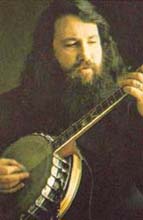
- Séamus Ennis – World Library of Folk and Primitive Music, Vol. 2: Ireland 1951 (Alan Lomax field recording)
- Burl Ives – Songs of Ireland 1958, as "Kilgary Mountain"
- The Highwaymen – Encore 1962
- The Brothers Four – In Person 1962, as "Kilgary Mountain"
- The Limeliters – Sing Out! 1962, as "Kilgary Mountain"
- Robert De Cormier – Dance Gal - Gimme the Banjo 1964, as "Kilgary Mountain"
- The Seekers – The Seekers 1964
- Peter, Paul and Mary – A Song Will Rise 1965, as "Gilgarra Mountain"
- Joe Dassin – Mâche ta chique 1965
- The Dubliners – 1967 (Album), 1968 (Single), 1969 (Album)
- Thin Lizzy – November 1972 (Single) September 1973 (Album)
- Euskefeurat – Mutta Herra Jumala 1982
- The Pogues – 1990, with The Dubliners
- Jerry Garcia, David Grisman – Shady Grove 1996
- Metallica – Garage Inc. 1998
- Smokie (band) – Uncovered 2000
- The Poxy Boggards – Lager Than Life 2002
- Johnny Logan – The Irish Connection 2007
- The High Kings – Memory Lane 2010
- Blaggards – Live in Texas 2010
- Celtic Thunder – Heritage 2011
- Nolwenn Leroy – Bretonne 2011 (only the deluxe edition)
- Stompin' Tom Connors – Stompin’ Tom and The Road’s of Life 2012
- Santiano - Bis Ans Ende der Welt 2012
The song has also been recorded by singers and folk groups such as Roger Whittaker, The Irish Rovers, Seven Nations, Off Kilter, King Creosote, Brobdingnagian Bards, Charlie Zahm, and Christy Moore.
Contrary to common belief, The Clancy Brothers never recorded the song. The confusion stems from the album Irish Drinking Songs, which is composed of separate tracks by The Dubliners and The Clancy Brothers, with the former performing "Whiskey in the Jar"; the same compilation includes the Clancy Brothers singing "Whiskey, You're The Devil", in which the line "There's whiskey in the jar" occurs several times. Liam Clancy did record it with his son and nephew on Clancy, O'Connell & Clancy in 1997, and Tommy Makem recorded it on The Song Tradition in 1998. The High Kings, featuring Bobby Clancy's son Finbarr, released a version in February 2011.
Thin Lizzy's 1972 single (bonus track on Vagabonds of the Western World [1991 edition]) stayed at the top of the Irish charts for 17 weeks, and the British release stayed in the top 30 for 12 weeks, peaking at No. 6, in 1973. This version has since been covered by U2, Pulp (first released on a 1996 various artist compilation album Childline and later on deluxe edition of Different Class in 2006), Smokie, Metallica (Garage Inc. 1998, which won a Grammy), Belle and Sebastian (The Blues Are Still Blue EP 2006), Gary Moore (2006), Nicky Moore (Top Musicians Play Thin Lizzy 2008), Simple Minds (Searching for the Lost Boys 2009), and Israeli musician Izhar Ashdot. The song is also on the Grateful Dead live compilation So Many Roads disc five.
On the bluegrass scene, Jerry Garcia and David Grisman recorded a version for the album Shady Grove. It has also been performed by the Scarecrows bluegrass band and the Dutch band Blue Grass Boogiemen.
Icelandic folk band Þrjú á palli recorded it in 1971 as "Lífið Er Lotterí" with lyrics by Jónas Árnason. Lillebjørn Nilsen adapted it to Norwegian, as "Svikefulle Mari", on his 1971 album Tilbake. Finnish band Eläkeläiset recorded a humppa version as the title track of their 1997 album Humppamaratooni. In 2007 the Lars Lilholt Band made a Danish version, "Gi' Mig Whiskey in the Jar", for the album Smukkere Med Tiden. Estonian band Poisikõsõ recorded "Hans'a Õuhkaga" on the album Tii Päält Iist in 2007.
In 1966, the Yarkon Bridge Trio, an Israeli singing group, recorded a song named "Siman Sheata Tsair" ("It Is a Sign That You Are Young") set to the melody of "Whiskey in the Jar"; the song became a big hit and was later covered by various artists, notably by Gidi Gov.
From
Wikipedia, the free encyclopedia
[
en.wikipedia.org/wiki/Whiskey_in_the_Jar].
Wikipedia® is a registered trademark of the
Wikimedia Foundation, Inc., a non-profit organization.
Text is available under the Creative Commons Attribution-ShareAlike License.
Listen to The Wild Rover from: Mick West, Maeve Mackinnon
Watch The Wild Rover from: The Dubliners (2012) Ronnie Drew, Luke Kelly
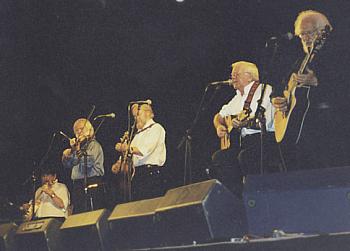
![]() Brian Peters also sang it on his 2015 CD
Squeezebox, Voicebox.
This video shows Brian Peters at the National Folk Festival, Canberra, 2016.
Brian Peters also sang it on his 2015 CD
Squeezebox, Voicebox.
This video shows Brian Peters at the National Folk Festival, Canberra, 2016.